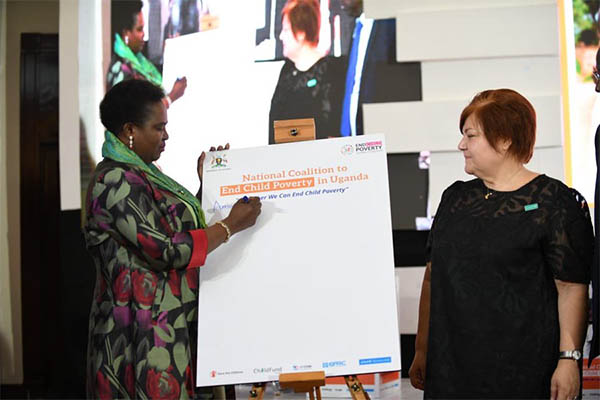
Kampala, Uganda | THE INDEPENDENT | Children have asked the government to prioritize better social services and the promotion of talent as a solution to poverty.
Speaking during the launch of the National Coalition to End Child Poverty, young people voiced their concerns about the current state of education, healthcare, and opportunities for talent development.
The children highlighted how inadequate access to quality education and healthcare has exacerbated poverty levels, particularly in rural areas. Many of them emphasized that without better support systems, children are left vulnerable, and unable to achieve their full potential.
“We need more schools, and those schools should be equipped with proper learning materials,” said Ainembabazi Mugarura, a student at Mengo Senior School. “Our health centres are not functioning well, and sometimes children miss school because they can’t get proper medical attention.”
According to the 2024 UBOS Multidimensional Child Poverty Report, nearly half (44%) of children in Uganda are living in poverty, lacking access to essential needs such as food, water, shelter, education, and healthcare. The report also highlights that in households with three or more children, the child poverty rate rises to 57 percent.
John Vianney Kato, a member of the Children’s Reference Group in Kampala, emphasized that providing quality education is key to breaking the cycle of poverty for children from impoverished households. “If the government ensures quality education, there’s a high chance to transform the future of these children,” he said. However, he warned that if this isn’t prioritized, poverty will likely persist across generations.
The National Coalition to End Child Poverty in Uganda is currently being launched at Serena Hotel under theme Together we can end Child poverty @UNICEFAfrica
@Mglsd_UG @UNICEFSocPolicy @globalcoalition @UNinUganda @UNICEFUganda @EPRC_official#EndChildPoverty #InvestInUGchildren pic.twitter.com/iVyABTPgjD— Kyobe Sarah. N (@kyobesarah) November 5, 2024
Kato acknowledged the government’s efforts to provide universal primary and secondary education but noted that many families facing multidimensional poverty still struggle to afford the associated costs. As a result, many children drop out before completing primary school. “Education is not as free as it’s claimed to be. In addition to being free, the quality of education must be consistent across both urban and rural areas to ensure true equity,” Kato stressed.
Innocent Oketh, a pupil at Kasubi Church of Uganda primary school, pointed out that the severe lack of necessities often forces children into various vices as they struggle to survive. To the amusement of the audience, he described how young girls are exploited by different individuals, while boys often turn to delinquency.
Beyond social services, the children also stressed the importance of nurturing their talents. Many argued that promoting skills such as sports, music, and arts could provide an alternative pathway out of poverty.
Oketh called on the government to create platforms where children could showcase and develop their talents. “If the government invested in supporting young people with talent and vocational skills, we could change our lives and even our communities,” he added.
Mondo Kyateka, Assistant Commissioner for Youth and Children Affairs at the Ministry of Gender, Labor, and Social Development, stressed that the concerns raised by children cannot be ignored, as they highlight Uganda’s future challenges. He pointed out that children make up more than half of the country’s population, with the most recent census indicating that 22.2 million of Uganda’s 45.9 million people are children.
Kyateka emphasized that addressing child poverty is essential for Uganda’s progress. He explained that effectively tackling this issue could allow the country to benefit from its population dividend, but warned that failing to do so would result in serious long-term consequences. He agreed that the best way to combat child poverty is by ensuring the government provides adequate social services, giving children from poor families a chance to succeed.
He noted that if a child, regardless of their background, receives a quality education and related social services, it can transform their life and help them reach their full potential.
Betty Amongi, the Minister for Gender, Labor, and Social Development added that, in addition to improving social services, the government is focusing on boosting household incomes to ensure families have enough resources to support themselves in all aspects of life.
Amongi emphasized that by tackling household poverty, the country can simultaneously address child poverty, as families would then be in a better position to provide for their children.
Margarita Tileva, UNICEF’s Deputy Resident Representative, emphasized that Uganda has the opportunity to leverage existing data to integrate child poverty into the National Development Plan Four, which is currently in draft form.
The National Coalition to End Child Poverty which was launched is an initiative led by the government, specifically through the Minister of Gender, Labor, and Social Development, along with other ministries and development partners like UNICEF and ChildFund. This collaboration aims to adopt a multifaceted approach to eliminate child poverty.
Catheline Ntabadde, UNICEF spokesperson, stated that the coalition, leveraging its expertise, will come together to seek viable solutions and mobilize communities to address child poverty, which significantly impacts children’s well-being, growth, and development.
*****
URN
 The Independent Uganda: You get the Truth we Pay the Price
The Independent Uganda: You get the Truth we Pay the Price



 Anthony Natif notes from Court: Prosecution case enters final stretch
Anthony Natif notes from Court: Prosecution case enters final stretch
